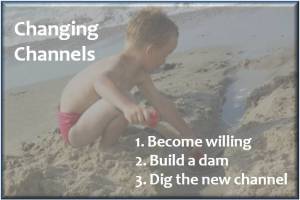 The Serenity Prayer, written by Reinhold Niebuhr in the 1930’s or 40’s begins with 3 lines that are well known to people with and without 12-Step experience.
The Serenity Prayer, written by Reinhold Niebuhr in the 1930’s or 40’s begins with 3 lines that are well known to people with and without 12-Step experience.
God, grant me serenity to accept the things I cannot change,
Courage to change the things I can, and
Wisdom to know the difference.
I have been pondering how to distinguish the things I can change from those that I cannot change. Niebuhr says that wisdom will help us to know the difference, and I certainly pray for wisdom. But other than receiving direct personal revelation about specific things in my life, I would like to have some guidelines for this sorting process.
I know that I can only change myself; trying to change someone else is clearly unwise and usually backfires. In the case of my aging parents, I can try to be sure they get the care that they need, and show them my love in every way I know how, but I cannot control the outcome. I have no control over their illnesses and infirmities. I cannot add one day to their lives nor can I spare them the confusion and frustration they sometimes experience.
But what about children? There the boundaries are not so clear. When they were very small, of course, I controlled everything about their lives, but even then, even my best efforts to comfort and console them and meet their physical needs did not always stop their tears.
The boundaries get more blurry as they get older. For a while I could “make them” do what I wanted (which might not have been such a great idea even then) but eventually my ability to do that disappeared. If a teenager decides that they are simply not going to do something (or are going to do something ill-advised), regardless of the consequences, there is not much a parent can do.
But don’t I have a responsibility to teach this teenager life skills? To keep them safe? To make sure that they develop the good habits that will serve them well as adults? To ensure that they don’t make the same mistakes I did, so they won’t suffer the same consequences I had to suffer?
Sadly, I must admit to myself that once I have made my best effort to give them the information they need, and teach them how to do the things they need to do, my part is done. If I demand that they comply (thereby taking away their agency) I risk ruining the relationship and pushing them to rebel. If they choose to ignore what I have taught and showed them, they will have to live with the consequences, both current and future. My acceptance of my limitations regarding the things I cannot change brings me peace and serenity. Trying to control what I cannot change brings frustration, heartbreak and chaos.
Most importantly, I need to model healthy, mature behavior by working my own program, including taking my own inventory and maintaining my own sobriety. The rest of the Serenity Prayer gives me guidelines for living my own life.
Serenity Prayer
By Reinhold NiebuhrGod, grant me serenity to accept the things I cannot change,
Courage to change the things I can, and
Wisdom to know the difference.
Living one day at a time,
Enjoying one moment at a time,
Accepting hardship as a pathway to peace,
Taking, as Jesus did,
This sinful world as it is,
Not as I would have it,
Trusting that You will make all things right,
If I surrender to Your will,
So that I may be reasonably happy in this life,
And supremely happy with You forever in the next.
- What distressing issues in your life are not within your control? Are you willing to turn them over to God?
- Is there anything that you have been trying to control without success? Write about whether it is within your area of stewardship or not.
- Choose something that you need to work on in your own life and seek guidance on how to approach it. Make a plan.



